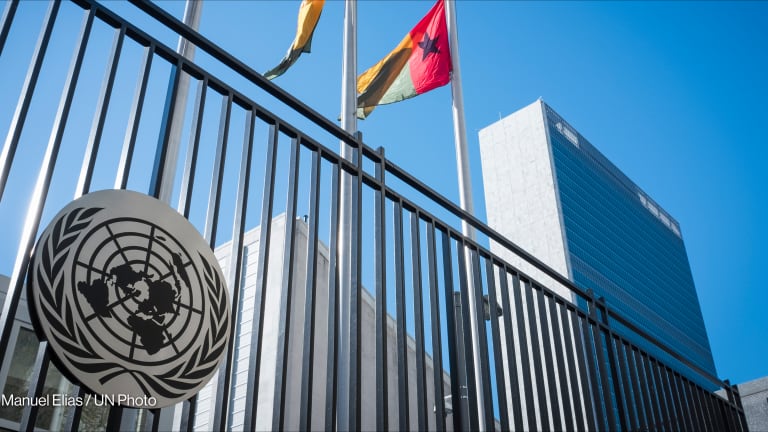
United Nations Secretary-General Antonio Guterres makes an appeal for the Paris climate agreement, the 70th World Health Assembly comes to a close and Germany rewrites its engagement with Africa. This week in development news.
When it comes to climate change commitments, United Nations Secretary-General António Guterres is urging the development community to look beyond the U.S. The U.N. chief — who did not mention U.S. President Donald Trump directly during his 25-minute opening remarks at New York University Stern School of Business on Tuesday — noted that China is the only country with a long-term economic plan with an eye on sustainability. Guterres presented a new five-point global climate action plan, calling for intensified political engagement on lowering global temperatures; stronger, “integrated” U.N. support for countries; and engagement with governments and private sector actors. He also announced plans to convene a U.N. climate summit in 2019 for the first, formal review of the Paris Agreement’s implementation.
After nearly two weeks of intense debates, the 70th World Health Assembly in Geneva came to a close on Wednesday — with several resolutions and key discussions on top of the election of new director-general Tedros Adhanom Ghebreyesus. After long and arduous discussions on the budget, outgoing Director-General Margaret Chan was able to convince member states to increase their assessed contributions by 3 percent, Devex’s Jenny Lei Ravelo reported. To address some of the key challenges in many African countries, the WHO’s regional office released a set of new programs that will include a focus on adolescent health and the creation of emergency hubs. Member states also took stock of the progress countries made in developing their national action plans to tackle the growing threat of antimicrobial resistance. Chan stressed that this World Health Assembly was “historic” in terms of the number of items approved and interventions addressed.
Crisis isn’t looming — it’s already present — in Yemen, which is facing "total social, economic and institutional collapse," according to U.N. Undersecretary-General for Humanitarian Affairs Stephen O'Brien. O'Brien warned the U.N. Security Council that "urgent action is needed" to bring the country back from the brink of famine and disease, the BBC reports. An outbreak of cholera has killed 500 people since late April, and the U.N. expects 150,000 more cases of the disease in the next six months. Despite "very generous pledges" at a conference in Yemen in April, O'Brien said that only 24 percent of the $2.1 billion needed for humanitarian aid in the country had so far been pledged and urged the international community to take action. At least 7,800 people have been killed and 44,000 others injured since March 2015, according to U.N. figures, while an estimated 18.8 million people are in need of humanitarian assistance.
Germany's development ministry has released an ambitious, private-sector oriented "Marshall Plan" to rewrite the country's engagement with the African continent. The proposal comes as Germany prepares to take a stronger lead in shaping donor policy ahead of hosting the G-20 summit. Analysts and advocates working in Africa say the plan puts into writing some of the trends already underway in aid, including a shift towards the private sector, but it’s still only a proposal, and Germany’s position on Africa is set to evolve rapidly in the coming weeks, writes Devex’s Andrew Green. The finance ministry is currently constructing a separate “Compact with Africa,” and the country is set to host the G-20 summit in July, where relations with Africa will feature heavily on the agenda. German elections in September could also impact the development agenda, particularly if Chancellor Angela Merkel loses her bid for a fourth term.
Join the Devex community and access more in-depth analysis, breaking news and business advice — and a host of other services — on international development, humanitarian aid and global health.








